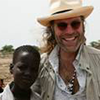Population
 Almost all of the problems of the world today either stem from, or are worsened by,
overcrowding. In October, 2011, the world’s population passed the 7 billion mark—seven
thousand million—7,000,000,000. That’s a lot of people.
Almost all of the problems of the world today either stem from, or are worsened by,
overcrowding. In October, 2011, the world’s population passed the 7 billion mark—seven
thousand million—7,000,000,000. That’s a lot of people.
To give you a sense of how fast this is changing:
- Since our grandfathers were born (around the beginning of the twentieth century) the world’s population has essentially quadrupled.
- Since our fathers were born (around the time of the Great Depression) the world’s population has essentially tripled.
- Since we were born (at the end of the Baby Boom) the world’s population has essentially doubled.
That is a staggering thought—there are twice as many people on the earth today as when we were born. Each day, about 200,000 more people are born than die, meaning that every month, we are adding the same number of new mouths to feed as the entire population of the state of Tennessee.
Who will feed 200,000 new people every day? Where will they get fresh water? What jobs will they do? How will they be educated? Where will they find homes? How will they live out their dreams?
Some would suggest that allowing people to die from disease, malnutrition, and natural disasters might be one solution to the problem of overpopulation. Why, it might be asked, are we so concerned with addressing the causes of death around the world, and, at the same time, bemoaning the increase in the world’s population? The simple answer is that there is an incredible difference between allowing people to die from the ravages of starvation, preventable diseases, or as the aftermath of a disaster on the one hand, and in taking a scientific and compassionate approach to educating women and providing acceptable birth control methods on the other.
Put more plainly, if you allow death to occur through the blunt instruments of fate, the blow that is struck just might hit home.
The authors would like to thank Ms. Katie Neel, MPH, for conducting initial fact-checking
for this article. The authors would also like to thank Alli Proffitt, Kate Etue, Brad
Lifford, and Dara Young for remarkably thoughtful and insightful editing and other
invaluable contributions.
This article reflects the personal views of the authors and does not necessarily represent
the views of their employers, co-workers, or others.
| Title | Info |
|---|---|
| Blog Posts |
Natural and Man-Made Disasters The U.S. Criminal Justice System Creativity and Freedom of the Press |
 Stout Drive Road Closure
Stout Drive Road Closure 

